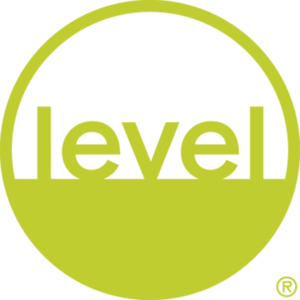Product label LEVEL® BY BIFMA
Find out more about LEVEL® BY BIFMA certification in accordance with the ANSI/BIFMA e3 standard for sustainable furniture .

LEVEL® sustainability certification for furniture (ANSI/BIFMA)
The LEVEL® product label shows that a product, a production facility and the responsible company fulfill the necessary requirements according to the ANSI/BIFMA e3 Furniture Sustainability Standard. The e3 sustainability standard for furniture forms the basis for a holistic, transparent process for assessing and communicating the ecological and social impact of products in the man-made environment. With the LEVEL ® certification program of the BIFMA, criteria for ecological and social aspects along the entire supply chain were defined, thus creating a measurable benchmark for sustainably produced furniture.
The BIFMA (Business and International Furniture Manufacturers Association) is the non-profit trade association for commercial and institutional furniture manufacturers. BIFMA is committed to the development and adaptation of standards, the promotion of sustainability throughout the entire life cycle and offers its members extensive resources for further education and information. BIFMA is accredited by ANSI to develop and submit standards and may submit its own systems through the ANSI approval process.
The ANSI (American National Standards Institute) is an organization that develops and coordinates national standards for consumer safety and health for various industries. Some of the BIFMA LEVEL® criteria are based on existing ANSI standards and other recognized standards for product testing and evaluation.
The BIFMA level® sustainability certification is suitable for the following product groups:
The BIFMA LEVEL® label is suitable for a large number of product groups in the area of business and institutional furniture. Here are the most important categories:
- Office chairs
- Tables and desks
- Filing cabinets
- Cupboards and storage units
- Seating for public areas
- Conference tables and chairs
- Workstations
- Reception furniture
Award criteria for the BIFMA LEVEL® sustainability certification
The award criteria for the LEVEL® product label are based on the ANSI/BIFMA e3 standard. The ANSI/BIFMA e3 Furniture Sustainability Standard is the first and leading sustainability standard for the furniture industry. The standard is reviewed and revised every five years in accordance with the ANSI process, with the next version due to be published in 2024. The aim of the standard is to highlight best practice examples that can reduce negative impacts on the environment, sustainability and social areas.
The LEVEL® product label is awarded on the basis of criteria in the following main areas:
- Materials: Assessment of sustainability and environmental compatibility.
- Energy and atmosphere: Efficient use of energy and reduction of environmental impact during production.
- Human and environmental health: Minimizing harmful emissions* and promoting healthy working conditions.
- Social responsibility: Consideration of ethical working practices and social responsibility within the company.
Pre-requisites must be fulfilled in each of these four areas, meaning that certified furniture must meet certain minimum requirements in the main areas. In addition, additional credits can be collected by fulfilling further requirements in order to achieve a higher certification level. The product label is awarded in the LEVEL 1, 2 and 3 performance levels depending on the degree of fulfillment.
*The emission requirements and requirements for the VOC content for the LEVEL® Product labels refer to the reduction and control of harmful substances in furniture products in order to improve indoor air quality. These requirements typically include strict limit values for VOC emissions, which are tested by independent laboratories. The emission tests are based on recognized standards such as ANSI/BIFMA M7.1 and X7.1. The exact VOC limit values for the various product groups can be found in the ANSI/BIFMA e3 Furniture Sustainability Standard (2019).
BIFMA LEVEL® : Certification body
The LEVEL® product label is not awarded by BIFMA itself, but by accredited third-party providers who are authorized to test and confirm compliance with the ANSI/BIFMA e3 standards. Some of the known testing bodies are:
- UL Environment (Underwriters Laboratories)
- Intertek
- SCS Global Services
- TÜV Rheinland
Costs for the BIFMA LEVEL® sustainability certification
Costs may vary depending on the complexity of the product, the number of tests required and the administrative fees. It is therefore advisable to enquire directly with an accredited certification body or with BIFMA itself.
Is the BIFMA LEVEL® product label mandatory?
The LEVEL® Certification is voluntary. It is sought by companies to mark their office furniture products as compliant with the standards of the Business and Institutional Furniture Manufacturers Association (BIFMA). There is no legal obligation to obtain this certification, but it is a voluntary measure to demonstrate the quality and performance of the products.
Recognition of the BIFMA LEVEL® product label in other certification systems
The BIFMA LEVEL® label can help with the sustainability certification of a building, as the BIFMA standards ensure that office furniture meets certain environmental and performance criteria.
For LEED certification, selecting low-emitting furniture that meets the requirements of the ANSI/BIFMA e3 standard (criteria 7.6.1, 7.6.2 and/or 7.6.3) helps to achieve points in the Indoor Environmental Quality (IEQ) category. If a product fulfills the criteria 7.5.1.3/e3-2014 or 7.4.1.3/e3-2012, points can be achieved in the Materials and Resources (MR) category.
LEVEL® certification can also help to gain points in other sustainability certifications such as DGNB or BREEAM, as it is an independent confirmation of product quality and performance and ensures compliance with defined standards.


